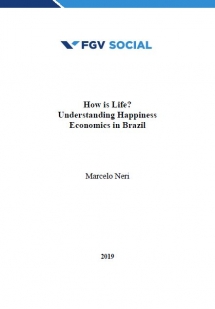
How is Life? Understanding Happiness Economics in Brazil - Neri, Marcelo Cortes
Sobre o paper:
ABSTRACT
DOES HAPPINESS TRACKS INCOME?*
This paper deals with the relationship between income and happiness, measured by life satisfaction, reported by people in many countries around the world, with special attention to the Brazilian experience. From the incorporation of specific questions to the SIPS questionnaires, taken from internationally acknowledged research, it was possible to specifically address national issues and compare them to more than 132 countries. Using as a reference the empirical research of Deaton (2007)[1], but with a different functional specification, a high correlation between income and life satisfaction is demonstrated. From the estimation of a "happiness function", weights were established and assigned to each component of the Human Development Index (HDI) concerning satisfaction with current life. The results indicate that income explains about 66% of the variation in life satisfaction, against 31% of life expectancy, leaving less than 3% explained by components of education. Another result of the research was the creation of a wealth indicator to measure the relation of how happiness varies among people from different countries. The results show that there is a positive long-term correlation between present life satisfaction and material conditions, both in Brazil and throughout the world. However, Brazilian happiness is relatively indifferent to material conditions, which is exemplified by the fact that no country in the world, among the 132 surveyed, shows a lower correlation between the two variables than Brazil.
The low sensitivity of Brazilians towards material living conditions and income is shown by the fact that the Northeast region, although the poorest in the country, shows the highest level of current happiness. A good deal of the relation between income and happiness in Brazil is explained by the transition of those with no income at all to the lowest income range studied, indicating a great potential for public policies focused on the poorest. In fact, the relation controlled by several socioeconomic factors between implicit income variation in the expansion of the Bolsa Família and the variation of happiness of the same person over time shows positive results when compared to other transitions, less targeted on the poorest. Data indicates that the beneficiaries of the program earn an additional 0.41 point of happiness in relation to non-beneficiaries. This result indicates that redistributive policies, of which the Bolsa Família is the greatest Brazilian example, can lead, in aggregate terms, to greater overall happiness of the nation in the short run.
REFERENCES
This paper was published in:
Book
NERI, Marcelo C.. A Felicidade Acompanha a Renda?. In: Marcelo Côrtes Neri; Fábio Schiavinatto. (Org.). SIPS 2014: percepções da população sobre políticas públicas. 1ed.Brasília: IPEA, 2014, v. 1, p. 285-307.
Site
NERI, Marcelo C. Como Vai a Vida? Entendendo a Economia da Felicidade. 2019. FGV Repositório Digital. Available online at: <http://bibliotecadigital.fgv.br/dspace/handle/10438/27341>
NERI, Marcelo C. How is Life? Understanding Happiness Economics in Brazil. 2019. FGV Social. Available online at: <https://cps.fgv.br/en/how-life-understanding-happiness-economics-brazil>




